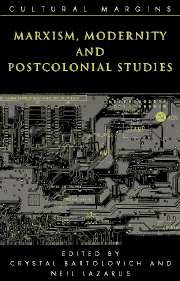1 - Introduction: Marxism, modernity and postcolonial studies
Published online by Cambridge University Press: 22 September 2009
Summary
This book has its origins in a panel on “Marxism and Postcoloniality” organized by the editors for a “Rethinking Marxism” conference at Amherst several years ago. The large turnout for, and lively discussion during, that session – even as a blizzard swirled around the building housing the meeting rooms – convinced us that we should try to recapture the intellectual excitement of that day by continuing the conversation in print. Some of the contributors to this volume were participants in that conference; others were invited to add their thoughts later. All, however, share with the editors the convictions that Marxism and “postcolonial studies” have something to say to each other – and that there might be more productive ways of dealing with their differences than have been exhibited hitherto. There has, in fact, been little direct, serious dialogue between Marxists and postcolonial theorists. The neglect (even ignorance) of Marxism in postcolonial studies has often been countered by the reflexive dismissal of the entire field of postcolonial studies by Marxist writers.
- Type
- Chapter
- Information
- Marxism, Modernity and Postcolonial Studies , pp. 1 - 18Publisher: Cambridge University PressPrint publication year: 2002
- 7
- Cited by

